
Sign up to save your library
With an OverDrive account, you can save your favorite libraries for at-a-glance information about availability. Find out more about OverDrive accounts.
Find this title in Libby, the library reading app by OverDrive.



Search for a digital library with this title
Title found at these libraries:
| Library Name | Distance |
|---|---|
| Loading... |
Game theory is the study of strategic decision-making in politics, sports, diplomacy, and a host of other areas, but especially in economics. Understanding Economics: Game Theory introduces you to this fascinating field, which combines the fun and challenge of games with the logic of brain teasers. In 12 entertaining half-hour lessons, Professor Jay R. Corrigan of Kenyon College analyzes classics such as the prisoner's dilemma, the hawk-dove game, and the ultimatum game.Each lesson is devoted to a handful of examples, which you investigate in detail, working out the possible strategies for the different competitors and their expected payoffs. Along the way, you discover why it's hard to buy a good used car, why people confess to crimes they didn't commit, why athletes ignore the risks and use performance-enhancing drugs, and how to bid in different kinds of auctions to increase your payoff—and also why you might regret winning one special type of auction.Professor Corrigan covers fundamental concepts, such as dominant strategy and Nash equilibrium. He teaches you how to diagram a game with a payoff matrix, and you practice backward induction, where you start at the game's last round and work your way back to the beginning to determine your best opening move. After taking this course, you'll know what to do the next time you bargain for a used car or get caught in the frenzy of an auction.







